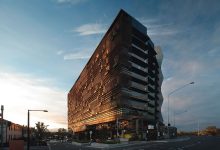Federal energy minister Angus Taylor has appointed investment manager Justin Punch as the new chair of the Australian Renewable Energy Agency chair after choosing not to re-appoint incumbent Martijn Wilder, and as questions remain over the future funding of ARENA.
But key questions about the future of ARENA, or the remaining board members remained unanswered on Friday. The agency is about to run out of funds, but the Clean Energy Council has suggested it needs at least $2 billion to lead the country through the renewable energy transition.
Punch previously served as a partner in equity investment firm Archer Capital, and has held senior executive positions with Simplot Australia and the Boston Consulting Group.
Punch currently serves as the chair of the Karrkad Kanjdji Trust, which works with Indigenous ranger groups to manage land conservation and sustainability projects, including the management of savanna burning initiatives that have received recognition under the Emissions Reduction Fund.
“Mr Punch is an experienced environmental investor focused on climate and energy investment. He has extensive experience in carbon offset investments, as well as business and finance having served as a Partner at Archer Capital, one of Australia’s most experienced private equity firms,” Taylor said when announcing the appointment.
Industry insiders welcomed his appointment, saying he understood the climate and clean energy space. The website of the Karrkad Kanjdji Trust says Punch “is an investor and company director focussed on environment and climate.”
Punch said in a statement that he would draw upon his previous experience working in investment management and carbon projects to his role as ARENA chair.
“The 2020s is the pivotal decade for the world to address climate change and bring to bear the most effective tools and technologies to accelerate our emissions reductions,” Punch said following his appointment as ARENA chair.
“Having had a career in building and allocating capital to successful businesses, including those involved in carbon and environmental markets, I’m very much looking forward to working with the team at ARENA to focus this experience on helping identify and unlock the investable technologies we need to lower our emissions and complete the energy transition that is now well and truly underway.”
“ARENA has done a remarkable job of bringing forward technologies we need to accelerate this energy transition and I look forward to working with the Board and management team to continue this trajectory.”
The terms of the previous ARENA board expired on Friday. The expiry of the board terms currently leaves ARENA with just two appointed board members, the new chair Justin Punch and the deputy secretary at the Department of Industry, Science, Energy and Resources, Jo Evans, who holds an ex-officio position.
RenewEconomy understands that Martijn Wilder was under consideration for reappointment as chair of the ARENA board, and was keen to continue, but that the Morrison cabinet instead decided to make a new appointment to the chair position.
Taylor indicated that appointments to the remaining board positions will be announced in the near future. It is understood that this delay is due to disagreements within the Morrison cabinet as to who should be appointed to the ARENA board and that the cabinet has yet to decide on its final makeup.
This conflict within the Morrison cabinet relate to wider questions about the future of Australia’s clean energy funding bodies, including the Clean Energy Finance Corporation and while this is expected to be resolved before the next federal budget is handed down in October, it may be several months before a decision is reached.
Wilder was appointed to the ARENA board under prime minister Malcolm Turnbull in April 2016 and had his appointment renewed for another two-year term in 2018.
Wilder has been a highly respected contributor to Australian climate and energy policy, through his roles as the head of Baker and McKenzie’s global environmental markets and climate change practice, as chair of the NSW Climate Change Council, as president of WWF Australia and more recently as a founding partner of Pollination advisory group.
Taylor offered a brief thanks to Wilder in his statement. “I thank the departing Chair Mr Martijn Wilder AM who provided exemplary service on the Board and to ARENA since 2016.”
The Clean Energy Council was more effusive.
“On behalf of the renewable energy industry, I’d also like to congratulate out-going Chair Martijn Wilder on his tenure, which drove ARENA’s support of the large-scale solar industry and showcased the capability of large-scale battery storage in particular,” CEC chief executive Kane Thornton said in a statement.
“ARENA’s support of research and development in world-leading technology has enabled the integration of renewables into the electricity grid. It is now accelerating the development of a competitive clean hydrogen sector.”
Thornton said it was critical that ARENA was put at the centre of Australia’s low-emissions technology agenda and be given a budget of at least $2 billion to ensure it can continue its work in accelerating the clean energy transition.
“The Agency must remain unencumbered by the interests of the fossil fuel industry and focus solely on the role of clean technologies,” Thornton said. “The clock is ticking. Other countries are also investing in building supply chains, and we must act swiftly if we wish to achieve our stated goal of becoming a global clean energy superpower and exporter of clean energy to Asian markets.”
ARENA CEO Darren Miller told a senate estimates committee late last year that ARENA had around $200 million of unallocated funding left to commit towards new research and demonstration projects.
Since that time, ARENA has made project funding commitments worth more than $32 million, in addition to $70 million in funding set aside to support new green hydrogen projects. Some of this funding has included support for the development of Renewable Energy Zones announced by the NSW Government.
It is likely that ARENA now has less than $100 million left in unallocated grant funding to support new renewable energy research and development projects.










